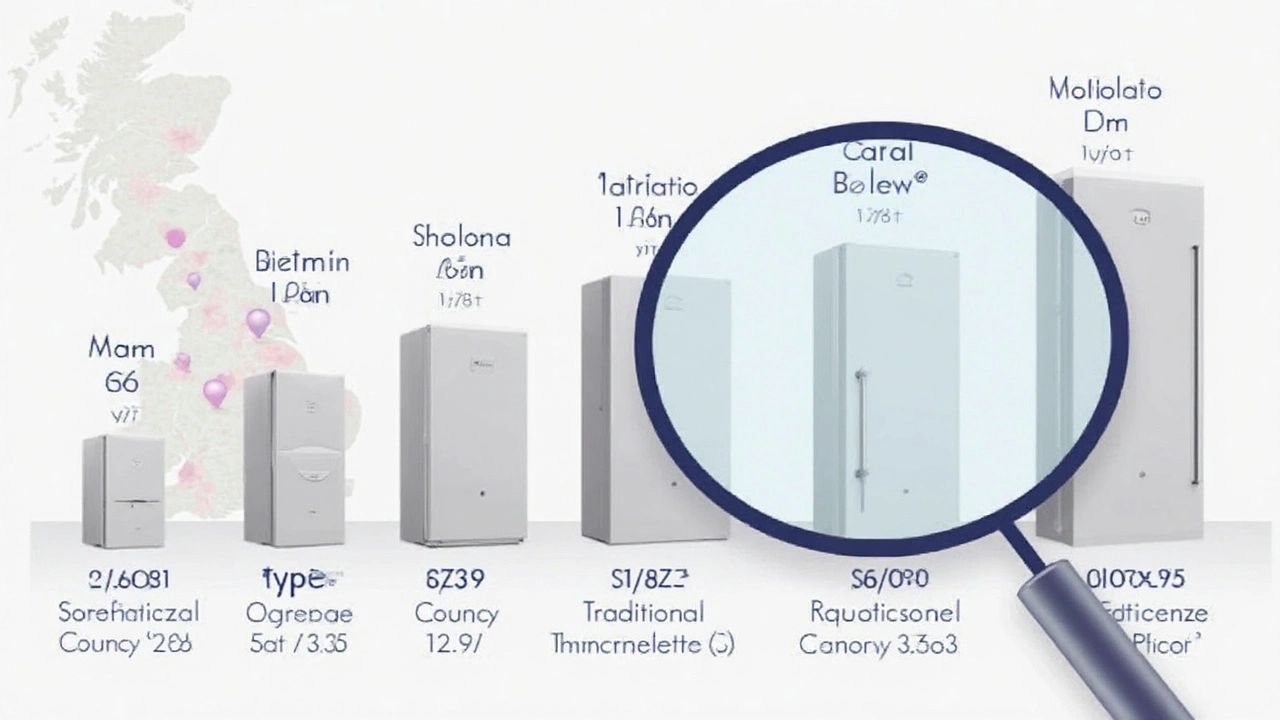Replacing a boiler isn't a small change—it can hit your wallet pretty hard. But knowing what goes into the cost can help you plan better. Let's think about this: the type of boiler you pick, like a combi or a system boiler, directly impacts how much it's gonna cost you.
The size and efficiency rating matter too. Bigger houses need bigger boilers, and more efficient boilers can cost more upfront but save you on bills down the road. Oh, and don't forget installation! That can be as much as the unit itself sometimes.
Wanna save some money? Keep up with regular maintenance. It might not seem like a big deal, but it really can keep your boiler running longer, putting off that need to replace it. Good news for your bank account, right?
- Understanding Boiler Replacement Costs
- Factors Influencing Prices
- Cost-effective Tips for Homeowners
- Signs It's Time to Replace Your Boiler
- Installation and Hidden Fees
- Getting the Best Deal on a New Boiler
Understanding Boiler Replacement Costs
Diving into boiler replacement cost can feel like a trip into the unknown, but it's really about breaking down a few key components. When thinking about costs, you're looking at three main bits: the price of the boiler itself, the installation fees, and any extra parts you might need to get everything up and running smoothly.
The Boiler Unit
The main cost you'll encounter is, of course, the boiler itself. Prices can range widely, starting at around $1,500 for a basic model and hitting upwards of $4,000 for high-efficiency units. So why the gap? It often depends on the type. A combination boiler, or 'combi,' which heats water on demand, can be more upfront than a regular or system boiler but saves space and might cut your utility bills.
Installation Fees
Installation isn't just about getting the unit in place—it's the work behind it that adds up. Professional installation by certified technicians is a must for safety and efficiency. You can expect to add anywhere from $1,000 to $3,000 to your budget just for this. If your setup needs extra work, like adjusting pipework or adding ventilation, those figures might climb.
| Component | Cost Range |
|---|---|
| Boiler Unit | $1,500 - $4,000 |
| Installation | $1,000 - $3,000 |
Additional Factors
Ever notice how upgrades often come with hidden costs? When replacing a boiler, you might need to shell out for new thermostats, radiators, or extra insulation to make it all sync up. It can run an extra few hundred dollars but think of it as an investment in your home's comfort and efficiency.
Understanding these pieces of the puzzle helps you plan ahead, avoid surprises, and maybe save a bit here and there. Getting quotes from several suppliers and planners is always a wise move to ensure you're not overspending.
Factors Influencing Prices
When you're eyeing a new boiler, a bunch of different things can jack up—or lower—the price. First off, the type of boiler you choose matters a lot. You've got your combi boilers, system boilers, and regular boilers. Each type has its own price range, and deciding which one fits your home's needs is step number one.
Size and Efficiency
The size of your boiler is key. Bigger isn't always better, but for larger homes, a large boiler is essential to ensure everyone's warm in winter. It's kinda like picking the right fridge size for your family. Also, the more efficient the boiler, the less energy it'll use, saving you money over time. Sometimes it’s worth paying extra for a model that's gonna shrink those energy bills down the line.
Brand and Quality
Brand does play a role. Go with a reputable brand, and you're likely looking at higher prices. But, good brands often mean reliability and longer warranties. It's that classic "you get what you pay for" situation.
Installation Complexity
Alright, let's talk installation. If you're replacing an old boiler with a similar one, you might not be looking at much extra cost. But changing the type or moving it to a snazzier spot in your home? That gets pricey. Installation isn't just about hooking it up; sometimes it's about updating pipes or even electrical work.
Location Factors
Where you live plays a part too. Urban areas might have higher labor costs compared to rural spots. And if you're in a region where boilers are more common, competition could mean better prices.
Seasonal Prices and Discounts
Here's a little trick: think about timing. If you buy in the off-season, like summer, you might score some sweet deals. Suppliers sometimes drop prices when demand is low, so it pays to plan ahead.
Boiler replacement cost isn't just about picking one off the shelf. It's this whole cocktail of choices, and weighing up what’s most important for your home and budget. Choose wisely, my friend!
Cost-effective Tips for Homeowners
So, you want to save some cash on that boiler replacement cost? You're in luck. There are several smart ways to keep those expenses in check without sacrificing comfort.
Regular Maintenance is Key
Don't skimp on regular check-ups. Keeping your boiler well-maintained not only stretches its lifespan but also boosts efficiency, saving you money in the long run. Schedule a service at least once a year. A skilled technician can spot potential issues before they snowball into costly repairs or a full replacement.
Consider the Efficiency
When it comes to picking a new boiler, think efficiency. Sure, high-efficiency models might sting a bit more upfront, but they pay you back through lower energy bills. For instance, an A-rated boiler can cut your annual heating costs by hundreds of dollars compared to an older, less efficient model.
Shop Around for Quotes
Don't settle for the first quote you get. It's a bit like shopping for a car—get at least three quotes. Different installers might offer different prices or package deals that include installation fees. This little bit of legwork can lead to significant savings.
Check for Rebates and Incentives
Sometimes, governments or local energy companies offer rebates or incentives for upgrading to energy-efficient heating systems. A quick check online or a call to your energy provider can reveal if there's money on the table you're missing out on.
DIY Insulation
While you're at it, think about small improvements like insulating your home better. Easy wins like sealing windows or adding a draft excluder to doors mean your new boiler doesn't have to work as hard, which also cuts down on wear and tear.
Plan Ahead
If your boiler is getting on in years, start planning for a replacement now. Last-minute decisions when the boiler finally packs in often mean more expensive solutions because of desperation. Instead, take your time to research, budget, and take advantage of seasonal discounts.

Signs It's Time to Replace Your Boiler
So, how do you know when to finally let go of your old boiler? There're a few telltale signs that should have you thinking about a new one.
Increased Energy Bills
If you've noticed your energy bills creeping up steadily without any change in usage, your boiler might be the culprit. Older boilers work less efficiently and end up using more fuel to get the same job done.
Frequent Repairs
Has your boiler become best friends with your repairman? Constant breakdowns and repair sessions could mean it's nearing the end of its lifespan. At some point, you're spending more on boiler repair than you would on a fresh unit.
Noisy Operation
A well-functioning boiler should be pretty quiet. If you're hearing banging, clunking, or whistling noises, it's a red flag. These sounds often mean internal parts are worn out.
Uneven Heating
Spotty heating can be frustrating. If some rooms are much warmer than others, or if the radiator takes ages to heat up, your boiler might be losing its touch. This uneven heating is often a sign that your boiler is struggling.
Older Than 15 Years
If your boiler has been around for over 15 years, it might be time to say goodbye. While some can last longer with good maintenance, newer models are usually far more efficient, potentially saving you money on energy bills.
Keep an eye on these signs. If you're spotting more than a couple, it's probably time to start budgeting for a new, more efficient boiler replacement.
Installation and Hidden Fees
When you're considering a boiler replacement cost, it's easy to focus on the price tag of the unit itself. But let's not forget about the other half of the equation: installation. These charges can be unexpected and sometimes a little sneaky. It's not just about hooking it up; there’s more to it than that.
Why Installation Costs Can Spike
Not every home is the same, so the installation needs can vary greatly. Boiler installation might involve additional piping work, especially if there’s a tricky setup or if your system is outdated. Got your boiler in the basement? Stairs mean more effort and sometimes higher charges.
Common Hidden Fees to Watch Out For
- Permit Costs: Sometimes, you need a permit to replace a boiler, especially in older properties or some urban areas. Don't skip this if it's required, or you might get fined.
- Old Unit Removal: Getting your old boiler out of there can be another added fee. Some companies charge for this service separately, or in some cases, offer it as a complimentary service, so it's worth asking upfront.
- System Flush: Depending on the state of your existing system, a power flush might be needed to clean out all the gunk in your pipes—this isn’t cheap but can save headaches down the line.
Tips for Avoiding Unexpected Fees
Best tip? Get everything in writing. When you get your quotes, ask the supplier to break down every single cost—this includes materials, labor, and any potential extras. Shopping around isn't just for groceries! Consider getting at least three quotes from different installers. Just because one price is lower doesn't mean it includes everything you need.
Getting the Best Deal on a New Boiler
Alright, let's dive into how you can snag the best price for a new boiler replacement. First things first, never settle for the first offer you get. Take your time and shop around!
Compare Quotes
Start by getting quotes from at least three different suppliers. This way, you'll have a sense of the going rate and can spot any unusually high prices. Also, when comparing quotes, ensure they include installation costs—it can make a huge difference in the end.
Check for Discounts and Rebates
Sometimes, there are rebates from energy companies or government programs for installing more efficient boilers. These can be a game-changer, reducing your overall cost significantly. Always ask your supplier if any apply to you.
Consider the Total Cost of Ownership
While a cheaper boiler might look tempting, think about the long-term. An efficient model might cost more initially but can save you money on energy bills over time. Always factor in maintenance costs too.
Timing and Installer Specials
The time of year can also influence prices. For instance, getting a new boiler installation in the warmer months might be cheaper since demand is lower. Additionally, some installers offer specials or financing options to help spread out the cost.
Warranty and Service Agreements
Make sure to ask about warranties and service agreements. A solid warranty might save you money in case something goes wrong with the boiler repair needs. Sometimes, spending a bit more for extended coverage is totally worth it.
| Boiler Type | Estimated Costs |
|---|---|
| Combi Boiler | $2,500 - $5,000 |
| System Boiler | $3,000 - $6,000 |
| Conventional Boiler | $3,500 - $7,500 |
There you have it! Stay smart and diligent, and you'll find a deal that suits your needs without breaking the bank. Remember, taking the time now can save you a lot later.

